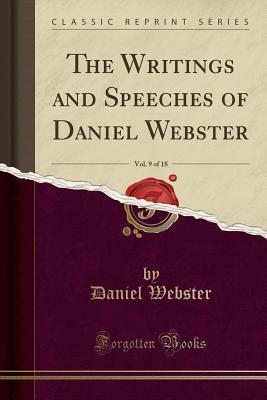Excerpt from The Writings and Speeches of Daniel Webster, Vol. 9 of 18
In the first place, as to the power. It is fortunately not an inferred or constructive power, but one of the express grants of the Constitution. Congress shall have power to establish uni form laws on the subject of bankruptcies throughout the United States. These are the words of the grant; there may be ques tions about the extent of the power, but there can be none of its existence.
The bill which has been reported by the committee provides for voluntary bankruptcies only. It contains no provisions by which creditors, on an alleged act of bankruptcy, may proceed against their debtors, with a View to subject them and their prop erty to the Operation of the law. It looks to no coercion by a creditor to make his debtor a subject of the law against his will. This is the first characteristic of the bill, and in this respect it certainly differs from the former bankrupt laws of the United States, and from the English bankrupt laws.
The bill, too, extends its provisions, not only to those who, either in fact or in contemplation of law, are traders, but to all persons who declare themselves insolvent, or unable to pay their debts and meet their engagements, and who desire to assign their property for the benefit of their creditors. In this respect, also, it differs from the former law, and from the law of Eng land.
About the Publisher
Forgotten Books publishes hundreds of thousands of rare and classic books. Find more at www.forgottenbooks.comwww.forgottenbooks.com
This book is a reproduction of an important historical work. Forgotten Books uses state-of-the-art technology to digitally reconstruct the work, preserving the original format whilst repairing imperfections present in the aged copy. In rare cases, an imperfection in the original, such as a blemish or missing page, may be replicated in our edition. We do, however, repair the vast majority of imperfections successfully; any imperfections that remain are intentionally left to preserve the state of such historical works.
In the first place, as to the power. It is fortunately not an inferred or constructive power, but one of the express grants of the Constitution. Congress shall have power to establish uni form laws on the subject of bankruptcies throughout the United States. These are the words of the grant; there may be ques tions about the extent of the power, but there can be none of its existence.
The bill which has been reported by the committee provides for voluntary bankruptcies only. It contains no provisions by which creditors, on an alleged act of bankruptcy, may proceed against their debtors, with a View to subject them and their prop erty to the Operation of the law. It looks to no coercion by a creditor to make his debtor a subject of the law against his will. This is the first characteristic of the bill, and in this respect it certainly differs from the former bankrupt laws of the United States, and from the English bankrupt laws.
The bill, too, extends its provisions, not only to those who, either in fact or in contemplation of law, are traders, but to all persons who declare themselves insolvent, or unable to pay their debts and meet their engagements, and who desire to assign their property for the benefit of their creditors. In this respect, also, it differs from the former law, and from the law of Eng land.
About the Publisher
Forgotten Books publishes hundreds of thousands of rare and classic books. Find more at www.forgottenbooks.comwww.forgottenbooks.com
This book is a reproduction of an important historical work. Forgotten Books uses state-of-the-art technology to digitally reconstruct the work, preserving the original format whilst repairing imperfections present in the aged copy. In rare cases, an imperfection in the original, such as a blemish or missing page, may be replicated in our edition. We do, however, repair the vast majority of imperfections successfully; any imperfections that remain are intentionally left to preserve the state of such historical works.
BUY NOW
Paperback, 310 pages
Published October 25th 2018 by Forgotten Books
© 2025 Bibleportal.com 版权所有.

Daniel Webster was a leading American statesman during the nation's Antebellum Period. He first rose to regional prominence through his defense of New England shipping interests. His increasingly nationalistic views and the effectiveness with which he articulated them led Webster to become one of the most famous orators and influential Whig leaders of the Second Party System.
Daniel Webster was an attorney, and served as legal counsel in several cases that established important constitutional precedents that bolstered the authority of the Federal government. As Secretary of State, he negotiated the Webster-Ashburton Treaty that established the definitive eastern border between the United States and Canada.
Webster tried three times to achieve the Presidency; all three bids failed, the final one in part because of his compromises. Similarly, Webster's efforts to steer the nation away from civil war toward a definite peace ultimately proved futile. Despite this, Webster came to be esteemed for these efforts and was officially named by the U.S. Senate in 1957 as one of its five most outstanding members.
... Show more